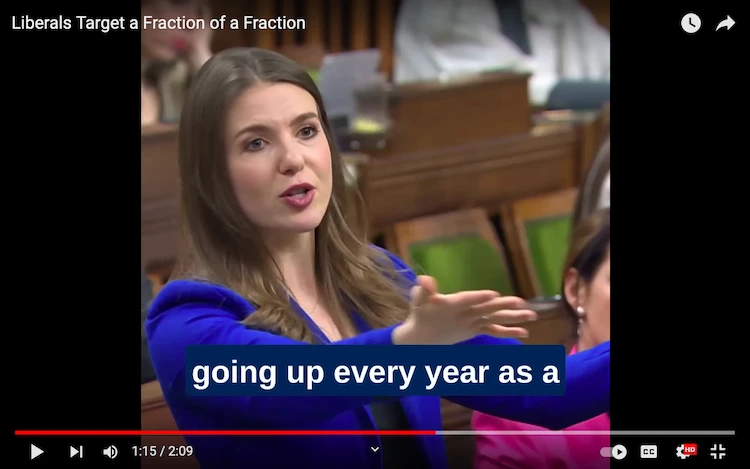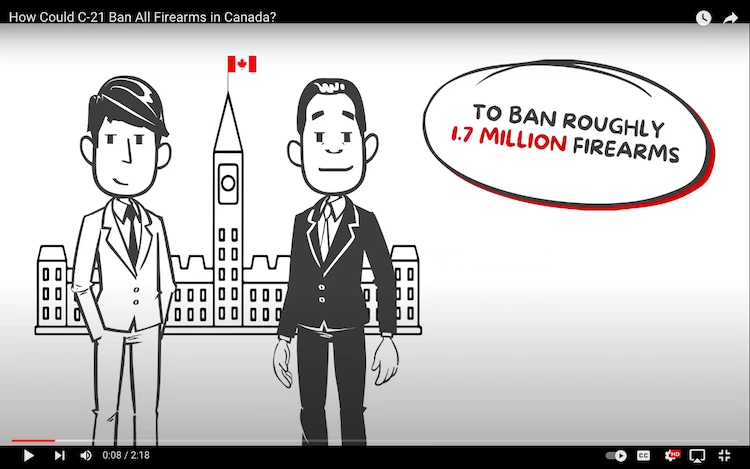Liberals Target a Fraction of a Fraction
Skills Gap Trainer comment:
Raquel Dancho’s insights and approach clearly demonstrate an understanding of statistical research methods and the application of applied science technology perspectives in analyzing legislation. Her keen ability to distinguish between correlations of legislation with the public and criminals is both insightful and crucial for informed policy-making.
It’s pivotal that the creation of such critical policies be grounded in impartial scientific research, and we are not yet certain, despite claims made, that science is utilized in the writing of the May 2020 OIC or Bill C-21. While the experiences of counsellors, therapists, surgeons or doctors who have witnessed and dealt with life-threatening or life-ending firearms related trauma, perhaps even on a very long term professional basis, these experiences are heartbreaking and should not be dismissed; however, it’s questionable how suitable they are in piecing together unbiased, scientifically authentic, statistical correlations on crime and statistical correlations to criminal activity. It’s questionable to base a legislation on personal medical experiences or professional medical experiences, rather than criminal data analysis, public safety security analysis and professional data science experts who understand the drivers of criminality with firearms (ie: citizen professional standing, citizen economic stability, citizen social stability, lifestyle analysis, etc. – citizen metrics that can be used as predictors of criminal activity). Heightened emotions driven by medical practice, and potential gender biases may influence their judgment, leading to an unbalanced perspective. Furthermore, to ensure a comprehensive and holistic approach, it would be ideal to have a balance of both male and female scientists involved. This ensures varied viewpoints, further reducing potential sources of error and bias.
The expertise of specific professionals would be invaluable in this context. Engineers, engineering technologists, applied science technologists, statisticians, data science experts and mathematicians would offer a more data-driven, detached, precise analysis, and full analysis. These professionals are trained to discern patterns, understand nuances, and provide objective assessments, big picture assessments rather than medical only assessments, without being swayed by medical, cultural or personal experiences.
Moreover, an amateur assessment based on gun attributes will likely miss the mark in achieving the intended objective. By focusing on the metrics of firearms instead of correlating legislation to specific attributes of citizens, we may inadvertently target law-abiding gun owners instead of potential criminals. General bans, while seemingly comprehensive, lack the precision needed to specifically target criminal elements. It’s much like casting a wide net hoping to catch a particular type of fish – it’s neither efficient nor effective.
Dancho’s argument that the current legislation against rifles is more against the general public than against criminals is a testament to the inadequacies in our current approach. It’s refreshing to see someone in her position both understand and vocalize these intricacies. Her insight into figuring out the hidden correlation within the legislation is world class. Her speech quality is world class. Even the blue suit is world class. Other legislators should take note, respect the science, the real science.

Related books and resources:
“More Guns, Less Crime: Understanding Crime and Gun Control Laws” by John R. Lott Jr. – This book provides extensive statistical analysis on the impact of gun laws on crime rates, supporting the need for data-driven policy-making.
“The Bias Against Guns: Why Almost Everything You’ve Heard About Gun Control Is Wrong” by John R. Lott Jr. – Challenges many common perceptions about gun control, advocating for policies based on empirical data rather than emotional or biased arguments.
“Guns and Violence: The English Experience” by Joyce Lee Malcolm – Offers a historical perspective on firearm legislation and its impact on violence, adding context to the discussion of data-driven governance.
“Canadian Gun Control: Should the United States Look North for a Solution?” by Gary A. Mauser – This book examines Canadian firearm legislation and its implications, providing insights relevant to discussions about Bill C-21 and OIC May 2020.
“Armed and Considered Dangerous: A Survey of Felons and Their Firearms” by James D. Wright and Peter H. Rossi – Provides an empirical look into the relationship between criminals and guns, offering a basis for legislation that targets criminal use of firearms rather than lawful ownership.
“Reducing Gun Violence in America: Informing Policy with Evidence and Analysis” edited by Daniel W. Webster and Jon S. Vernick – A compilation of research that could inform a balanced, data-driven approach to firearm legislation similar to what Raquel Dancho advocates.
“Statistics for People Who (Think They) Hate Statistics” by Neil J. Salkind – While not directly about firearm legislation, this book offers an accessible introduction to statistical analysis, underscoring the importance of data in policy-making.
“Shooting to Kill: The Ethics of Police and Military Use of Lethal Force” by Seumas Miller – Provides a deep dive into the ethics and implications of using firearms, contributing to the broader debate on gun control and public safety.
“The War on Guns: Arming Yourself Against Gun Control Lies” by John R. Lott Jr. – Lott’s book provides arguments and data that could be used to challenge biased media narratives and ill-informed policies regarding gun control.
“Data Science for Policymakers: What You Need to Know” by Sarah Cordivano, Max Shron – Though not specifically about firearm legislation, this book illustrates how data science can inform more effective public policies, aligning with Dancho’s call for data-driven governance.
To see our Donate Page, click https://skillsgaptrainer.com/donate
To see our Instagram Channel, click https://www.instagram.com/skillsgaptrainer/
To see some of our Udemy Courses, click SGT Udemy Page
To see our YouTube Channel, click https://www.youtube.com/@skillsgaptrainer


